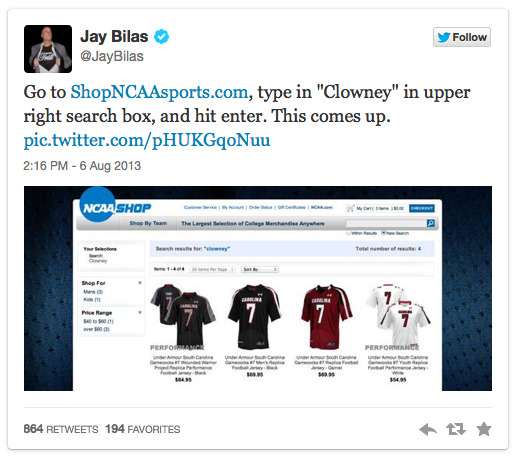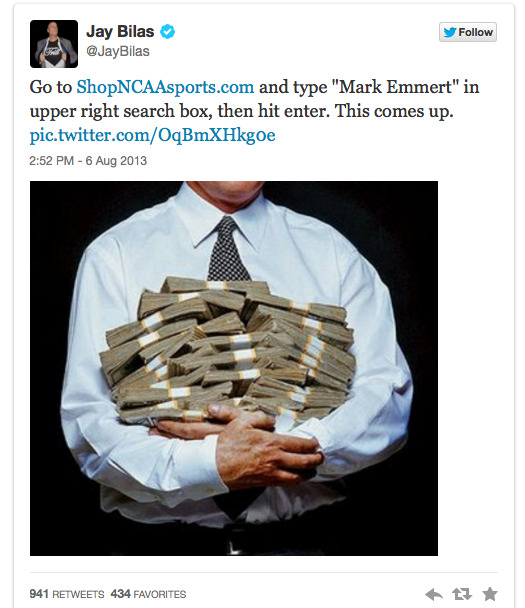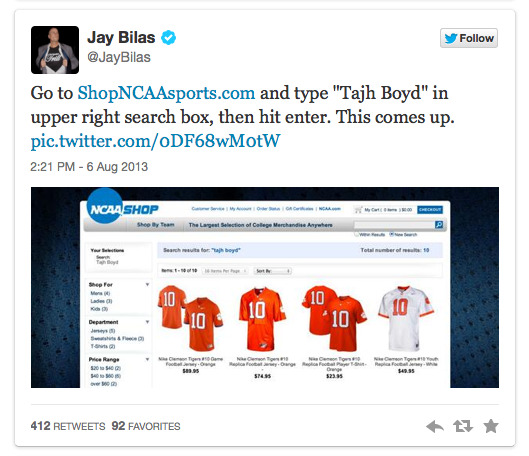Jay Bilas Tweets Shame NCAA
Bilas Tweets
Earlier this week, ESPN talking head Jay Bilas set the NCAA (for the uninitiated, that’s the organization that serves as the governing body for big-time collegiate sports in the U.S.) on its ears. His series of damning tweets illustrate how the NCAA capitalizes on the names and likenesses of amateur athletes, like Texas A&M’s Johnny Manziel and Clemson’s Tajh Boyd, to sell jerseys and other team-related memorabilia through an online shopping portal on their website.

 Background & Fallout
Background & Fallout
Bilas was spurred to action due to recent news leaks that Manziel was allegedly paid (well) to autograph several items for a noted memorabilia dealer from South Florida. How, Bilas contended, could the NCAA move to punish a player for receiving money for autographs while at the same time profiting from selling merchandise made popular by that same player.
To illustrate the point, he went to the NCAA online shop, began querying several players’ names and—lo and behold—found that the NCAA had souped up its search function to render relevant team merchandise whenever you entered a player’s name. Of course, Bilas’s initial tweets went viral, subsequent tweets on the same subject bordered on hilariously embarrassing for the NCAA.
Unable to recover from this PR disaster, the NCAA announced late Thursday that they would be closing their online store. Commented NCAA president Mark Emmert:
In the national office, we can certainly recognize why that could be seen as hypocritical, and indeed I think the business of having the NCAA selling those kinds of goods is a mistake, and we’re going to exit that business immediately. It’s not something that’s core to what the NCAA is about, and it probably never should have been in the business.
The Power of the Tweet
The ethical conundrum aside, the part of this that struck me as a content marketing professional was just how quickly Bilas’s tweets inspired action. I often hear clients questioning the power and business-impacting viability of social media, Twitter especially, but this situation serves as a cold bucket of water to all: if the message is compelling, it will inspire action.
Of course, an argument can be made that the NCAA folks should have been better prepared for something like this (Twitter Protocols, anyone?). After all Manziel, this summer’s token trouble magnet, has provided plenty of fodder, controversy and disciplinary action with his ill-conceived tweets over the last several months, so it’s not like Twitter has a history of being ignored.
Nothing is Sacred (or Immune)
With the Bilas vs. NCAA scenario, we see just how easy and quickly a few well-timed posts from somebody with a decent following can inspire action and humble a giant. This was clearly case of the right posts at the right time about the right topic. A perfect storm…unless you’re with the NCAA.
The lesson here is not “avoid social media if you’re a company or organization.” If you’re an online retailer, a non-profit or a B2B company, your strategy about what to and what not to publish (or optimize as a search term) can be founded on a simple idea: be what you want people to think you are. Let that little tidbit guide your efforts, and you’ll be a benefit to your users and probably never have to worry about Jay Bilas killing one of your revenue streams.
Joey Hall – VP Content Marketing

 Background & Fallout
Background & Fallout

